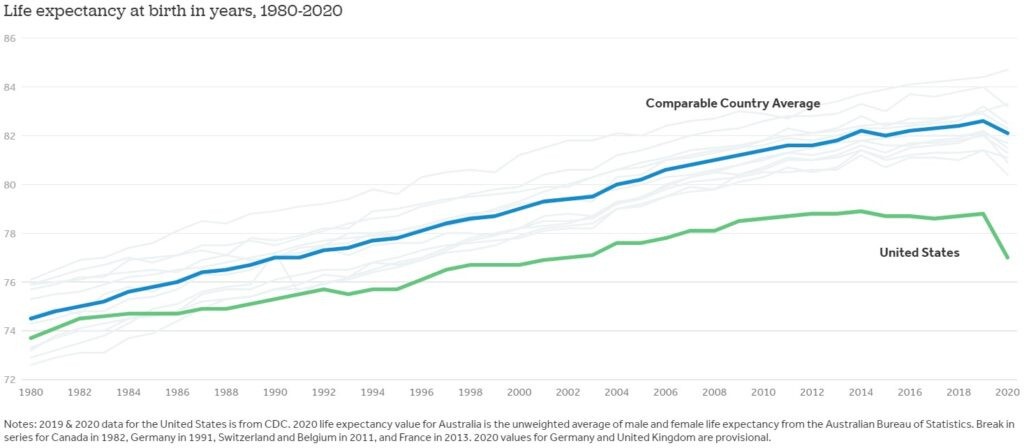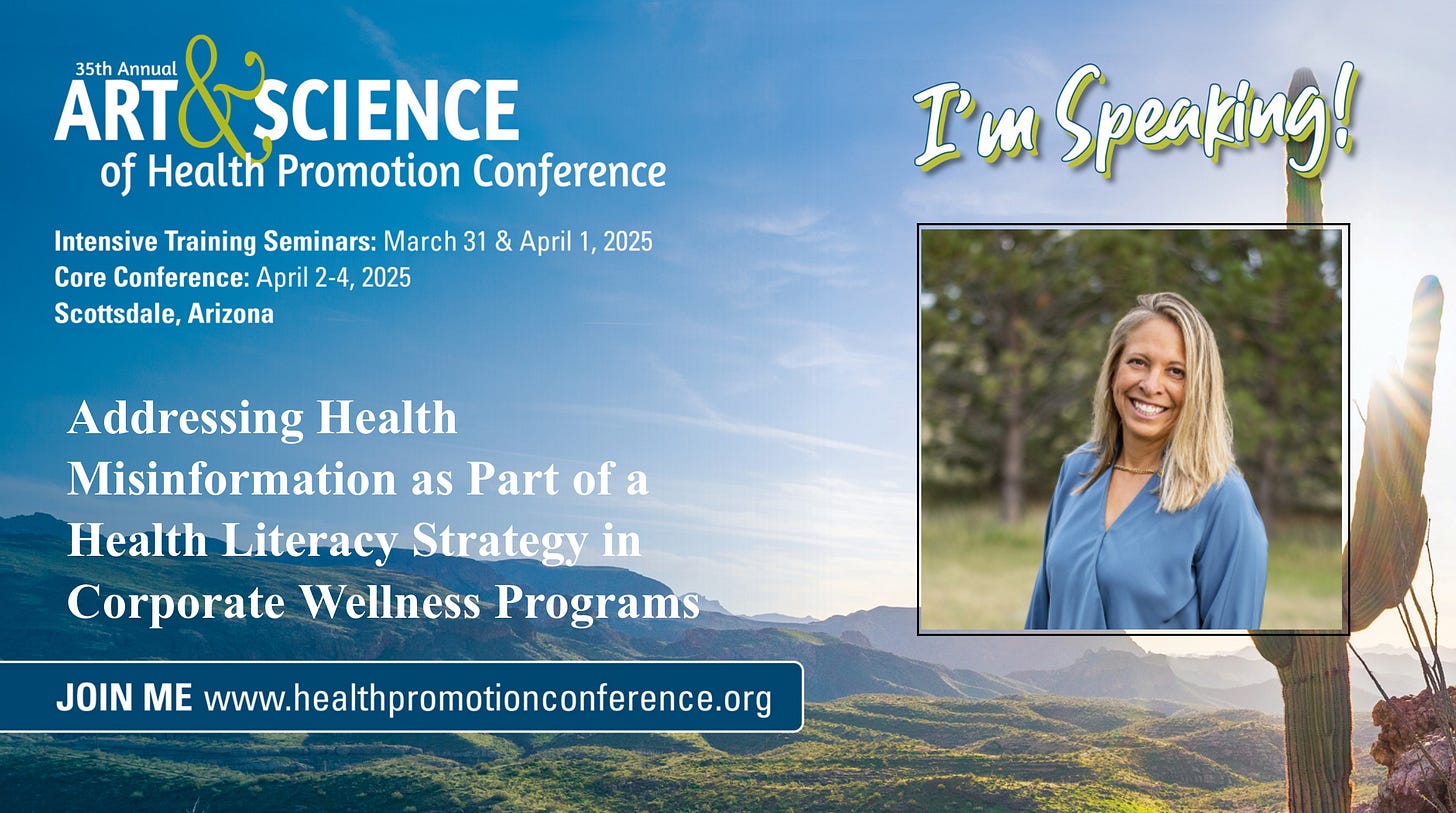You Don't Have to Be a Victim of the Healthcare Madness
🌱 Water and sunlight first. Treatments second.
Good morning, health heroes!
A bit of a personal essay this morning on what’s becoming one of my increasingly favorite topics of discussion: our medical-first approach here in the US.
America’s health is in trouble. Chronic diseases now affect 60% of American adults, and nearly 40% are living with multiple chronic conditions. Life expectancy in the U.S. has declined for the first time in decades, and healthcare spending continues to skyrocket without delivering better outcomes.
We’ve seen the statistics, heard the warnings, and maybe even shaken our heads in quiet frustration at how we got here. It’s a tidal wave, isn’t it? One that seems too powerful for any one person to stop.
I’ve seen it with my own eyes—friends and family members caught in the poor health culture of America today, struggling with the confusing healthcare system, frustrated by results from a medical approach they didn’t consider well. I’ve been there, too. I’ve had times where I hoped a doctor could help, and instead, I got medications that I needed to take for life.
While this can be good in some cases, it wasn’t necessary in mine or many others. Think about how many others are being led to do the same. It’s time to stop the madness and give power back to the people. Let’s help people think for themselves!
But they already are, you say? People are smart and go to their doctor just like they’re supposed to when they feel sick. They listen to their doctor, just like they’re supposed to. They follow their doctor’s advice, just like they’re supposed to.
Yes, that’s true. Most of us are doctor-first-minded — and look at where it’s gotten us. Sick and on medication without a healing plan.
Most of us can heal; we need an approach we can first go to. Unfortunately, it’s hard to know what to do next.
What if I told you that you—yes, you—can help stop the madness of the messed-up healthcare system on your own?
Yes, you.
It starts by asking deeper questions, like have I been getting the foundational health behaviors like exercise, nutrition, sleep, and hydration? Then, as you talk to your doctor, you can add strategies to address the gaps.
You first, doctor second — not the other way around, where you listen to your doctor and then do nothing differently to address the issue.
It might sounds harsh, but it’s the truth.
Imagine owning a plant that isn’t doing well because it isn’t being watered enough, and it lives in a closet most of the time— a life that omits two things, water and sunlight, that plants need to survive.
What’s the best course of action to bring it back to life? You could Google its symptoms, which is dubious at best, or take it to a plant doctor, who might suggest a spray that keeps the leaves green or a fertilizer to improve its vitality — likely without asking about its contributing conditions at home.
You might even buy the spray or the fertilizer, spending more than you had hoped to.
The plant still isn’t getting the essentials: water and sunlight. The spray “medicine” might brighten its leaves for a moment, but without the essentials, its postponing the inevitable death of the plant.
Remember that doctors do precisely what they’re supposed to do—treat health issues.
Our expectations of doctors need to change if we don’t want to ‘just be treated’ and desire true, deep healing from health issues.
There are always instances when doctors are the right course of treatment: let’s say you water your plant and put it in the sun, and although its leaves perked up and it gained new life and leaves, it contracted an infestation of mites.
The infestation needs to be treated, and a doctor can provide the right medicine or guidance to help. We all need medicine sometimes, and so we need doctors! But if without watering the plant and providing it sunlight, the medicine will not change its outcome.
Health literacy is at the heart of a good health decision—a skill that goes beyond simply understanding what health terms mean.
It’s about starting with curiosity and asking questions that get to the heart of the matter. It’s thinking critically about health decisions and not passively letting the doctor give us medication without wondering what our part is.
Health literacy isn’t just about knowing what’s healthy and what isn’t; it’s about empowering people to make decisions that align with their personal goals, values, and how they want to live and manage their health and life.
Consider a patient diagnosed with prediabetes, for example, who is encouraged to adopt lifestyle changes instead of immediately resorting to medication. By focusing on sustainable habits, like regular movement and whole food nutrition, they’re not just managing symptoms but reclaiming control over their health future.
It’s also about taking away the fear that comes with scary health issues and empowering people with the right information at the right time, and giving them hope that healing is possible.
Imagine if doctors told patients that before they tried a medication for high blood pressure, they had to focus on the Core 4 activities: exercise, nutrition, sleep, and hydration. Patients would address these areas for a few months and return to the office to see if their blood pressure had changed. If it didn’t, then they could discuss the medication route.
How many people would need medications, then? I would guess not nearly as many. Water the plant, give it sunlight, and give it a little boost of assistance with the spray. It will then not only survive but begin to thrive.
Start asking questions—of yourself and others.
🌱 Are you first doing what you need to do to not just survive but to thrive?
⛅️ Are you content with treating a health issue and not healing from it?
🪨 What foundational practices are missing that are preventing you from thriving?
🪸What small actions could you take today to help your health thrive? Could it be one more glass of water and a few more steps?
By fostering curiosity and critical thinking, we can change the narrative.
We can create a culture where people thrive. We can change America's health to be once again one of the healthiest places on earth, but it starts with you and me. Ask the hard questions to yourself, embrace curiosity about everything, and learn more about how to heal, not just treat a condition.
If we focus more on the healing, we’ll need less treatment. Recognize that you have more power to heal and be healthy than you think.
I'm here to help - if you need a place to start, please reach out!
In good health,
Dr. Alice
Speaking of —
I’ll be speaking soon in Scottsdale, AZ talking about health literacy strategies. You can find details and register here if you’re in the area!
(Anyone in Scottsdale that wants to grab a coffee or a glass of wine?) 🍷
A little more about Dr. Alice Burron and The Health Navigator Group:
Check out our website!
Catch us on Instagram: @the.health.navigator and @dr_burron
You can also connect on LinkedIn, if you want to be professional about it. 👓
And if you’re not subscribed to Health Shift here on Substack — it’s time! This letter is completely free and packed with useful tools to help you on your journey to better, faster healing.









